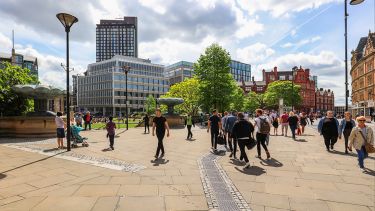The seventh State of Sheffield report provides an overview of the city, describing how things are and how they are changing.
This year’s report was edited by Professor David Robinson from the Department of Geography and draws on a range of data sources and reports to explore city-wide issues.
The annual report is a collaborative effort with organisations across Sheffield and looks at the city’s performance in six key areas: the economy, involvement and participation, safety and security, social and community infrastructure, health and well-being, and sustainability and inclusivity.
The city and its people have shown remarkable resilience, but there have been inevitable impacts on financial inequality, social cohesion and opportunities, particularly for young people.
Professor David Robinson
Professor of Housing and Urban Studies
Among the findings on this year’s report, Sheffield’s economy continues to grow and is outperforming other big cities in terms of economic vibrancy, according to accounting firm Grant Thornton’s Vibrant Economy Index. However, productivity remains a key challenge.
The report highlights the city’s vibrant community and social sector, with more than 3,000 active voluntary and community groups in Sheffield.
The city also remains a safe place to live with relatively low crime. It is noted that while crime has increased in Sheffield, the rate of increase has been lower than most other cities.
However, years of austerity have put ‘significant strain’ on vital public services in the city. The report highlights that some services are experiencing their toughest difficulties ever at a time when needs for these services are growing and becoming more complex.
The report also calls on more to be done to improve the mental and physical health of the city to help build a more inclusive economy. The authors note how mental and physical issues remain a barrier to getting more Sheffielders into work.
The impact of poor quality jobs on health is also highlighted as the report states with insecure, short-term jobs leading to anxiety and stress for workers.
Professor David Robinson writes in the report’s introduction: “The cranes on our skyline provided evidence of the changing centre of a city which has for 10 years seen national austerity and economic uncertainty impact on local service provision, economic productivity and household incomes.
“The city and its people have shown remarkable resilience, but there have been inevitable impacts on financial inequality, social cohesion and opportunities, particularly for young people.
“There are no easy solutions to these challenges. In an interconnected world, it can seem that we are at the mercy of forces over which we have no control or influence.
"Improving the odds by simply wishing away the causes of adversity is not an option, but it remains the fundamental determination of all those committed to Sheffield to make it possible to beat the odds, and to ensure Sheffield can respond with characteristic creativity and innovation, showing its traditional steel to overcome potential threats and promote successful development.
“This requires businesses, public institutions, service providers, communities and residents to work together to promote growth and create jobs and opportunities.”

